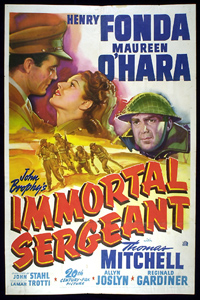Plot
In North Africa, experienced Sergeant Kelly leads a British patrol, accompanied by Corporal Colin Spence, an unassertive Canadian. When they are attacked by Italian airplanes, they manage to shoot one down, but it crashes on one of their vehicles, killing eight men. Later, Kelly leads the six survivors on an attack of an Italian armored car but is seriously wounded. He orders Spence to leave him behind; when Spence refuses to obey, he shoots himself.
Spence leads the remaining three men toward an oasis. Before they can reach it, though, a transport plane lands and disgorges German soldiers who set up a base. After sneaking in to steal badly needed food and water, Spence has to assert his leadership when one of his men advocates surrendering. Instead, Spence leads them in a surprise attack under the cover of a sandstorm. The British emerge victorious, though one man is killed and Spence is wounded.
The corporal comes to in a Cairo hospital and finds he is to be given a medal and promoted to lieutenant. His newfound assertiveness extends to his personal life. He proposes to his girlfriend Valentine, who he had thought of (in flashbacks) throughout his ordeal.
Reception
Theodore Strauss of The New York Times called the film "disappointing", writing that while it was "occasionally a warm and human study of a man's triumph over his own fears," the romance was "vapid" and O'Hara's character was "very dull". [4] Variety called the film "a compact drama, interestingly told." [5] Harrison's Reports wrote, "Although it does not reach great dramatic heights, and it is somewhat long drawn out, the production and the performances are so good that one's interest is held consistently." [6] David Lardner of The New Yorker wrote that the desert peril scenes were the "most solid aspects of the picture and, since they are fairly well handled, succeed in putting it on its feet." Lardner was distracted, however, by "the strange difficulty O'Hara seems to have in pronouncing polysyllabic words." [7]
This page is based on this
Wikipedia article Text is available under the
CC BY-SA 4.0 license; additional terms may apply.
Images, videos and audio are available under their respective licenses.
